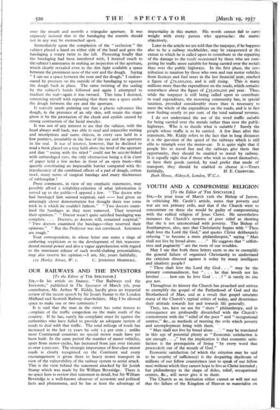YOUTH AND A COMPROMISE RELIGION [To the Editor of THE
SPECTATOR.] -
SIR,—In your issue of March 12th the Bishop of Jarrow, in criticising Mr. Castle's article, states that poverty and war are not primary evils, and that if the Church were to concentrate on these she would be guilty of compromising with the radical religion of Jesus Christ. He nevertheless instances the Church's systems of poor relief as showing that she is not unconcerned with poverty. The Bishop of Southampton, also, says that Christianity begins with " Thou shalt love the Lord thy God," and quotes Christ deliberately refusing " to• become a• mere philanthropist," saying Man shall not live by bread alone.. . ." He suggests that "selfish- ness and pugnacity" are the roots of our troubles.
May I say that both these letters seem to me to exemplify the general failure of organised Christianity to understand the criticism directed against it today by many intelligent and idealistic people?
"Thou shalt love the-Lord thy God. . . " may be the primary commandment, but " . . he that loveth not his brother . . . how can he love God . . . ? " is surely its sine qua non.
Throughout its history the Church has preached and striven to exemplify the gospel of the Fatherhood of God and the Brotherhood of Man, and as a result that gospel saturates many of the Church's typical critics of today, and determines their attitude towards her and towards life generally.
They, too, have no use for " mere " philanthropy, and in consequence are profoundly dissatisfied with the Church's contentment with the "relief of the poor" and "occupational centres," &c., as methods of meeting the evils which poverty and unemployment bring with them.
"Mali shall not hire by bread alone. .Y' may be translated in this age of potential plenty as "Economic satisfaction is net enough. . .," but the implication is that economic satis- faction is the prerequisite of living "by every 'word that proceedeth out of the Mouth of God."
Economic satisfaction (of which the criterion may be said to be . security of sufficiency) is the despairing daydream of millions of our fellow countrymen (not to speak of our fellow men) without which they cannot hope to live as Christ intended ; but plulanthrcipY in the shape of doles, relief, occupational centres, &C., will never give it to them.
The Church as an institution either cannot or will not see that the failure of the Kingdom of Heaven to materialise on- earth is because of neglect of the economic foundations. The Gospel is true, men are hungering to live in its truth, but if the Kingdom of Heaven is to come on earth, its basis must be economic. Only when the economic foundations of the Kingdom of Heaven are built can we look for its spiritual flowering.
It is the daily experience of satisfied and =satisfied people that they are uncomfortable in each other's presence. The rich can never love the' poor, nor the poor the rich, and to speak of the. Brotherhood of Man or the Kingdom of Heaven on the present unjust and unnecessary economic basis is to be guilty of ignorance or sentimentality.
What weask from the Church, as the trustee of the Gospel, is A blazing incursion in the name of Christ into the politico- economic realm, much in the spirit in which He cleansed the Temple, with a dear insistent command to the State to plan the national economy at whatever cost to vested interests in such a way as to abolish poverty, riches, and mass insecurity, denouncing these as sins against the Holy Ghost. . Similarly in international affairs, the Church knows what is right and waiting to be done. Let it but have the faith to insist on the application of the spirit of Christ to foreign policy, and its present critics would rally to it joyfully in their thousands instead of unhappily trying to digest Karl Marx.— Yours faithfully, GORDON P. EVANS. The International Club, Haymarket House, Newcastle-on- . Tyne 2.





































































 Previous page
Previous page